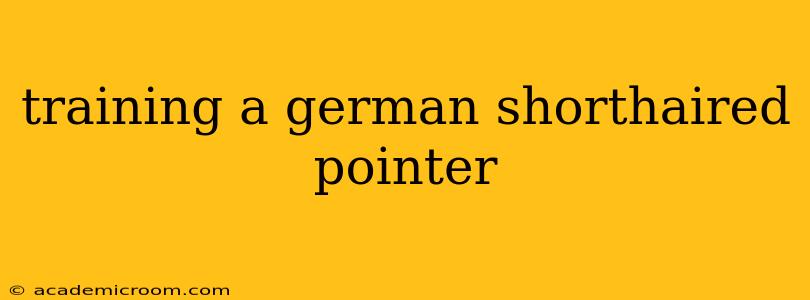The German Shorthaired Pointer (GSP), a breed known for its intelligence, athleticism, and unwavering loyalty, requires consistent and engaging training. Their innate drive to hunt and please their owners makes them highly trainable, but their energy and enthusiasm also demand a structured approach. This guide will cover essential training methods and address common questions regarding GSP training.
What is the Best Way to Train a GSP Puppy?
Starting early is crucial. Puppyhood is the ideal time to begin socialization and basic obedience training. Focus on positive reinforcement methods, using treats, praise, and toys as rewards. Short, frequent training sessions (10-15 minutes) are more effective than long, tiring ones. Key commands to begin with include "sit," "stay," "come," and "leave it." Enroll your puppy in puppy classes to socialize them and learn basic obedience skills in a controlled environment. Remember, consistency is key – everyone in the household needs to use the same commands and training techniques.
How Do I Stop My GSP From Jumping?
Jumping is a common problem with energetic breeds like GSPs. The key is to prevent the behavior before it starts. When someone approaches, turn your back and ignore the dog until all four paws are on the ground. Then, reward the calm behavior with praise and affection. Never reinforce jumping by petting or interacting with your dog while they're jumping. Consistent training and patience are essential to break this habit.
How Do I Train My GSP to Hunt?
GSPs are natural hunters, but proper training is essential for a safe and successful hunting experience. Start with basic obedience and recall training before introducing hunting-specific commands and scenarios. Gradually introduce your GSP to birds or other game, always under supervision. Use scent work and retrieving exercises to develop their hunting instincts and skills. Consider working with a professional hunting dog trainer to fine-tune your dog's hunting abilities. Safety should always be paramount; ensure your dog has reliable recall before unleashing them in the field.
What are Some Common Problems With GSP Training?
While generally intelligent and eager to please, GSPs can present certain training challenges:
- High Energy Levels: Their boundless energy requires consistent physical and mental stimulation. Without sufficient exercise, they may become destructive or difficult to manage.
- Independent Thinking: GSPs are intelligent and can sometimes be stubborn. Maintain a firm, consistent approach, using positive reinforcement to motivate them.
- Strong Prey Drive: Their strong hunting instincts can lead to chasing smaller animals. Proper training and recall are essential to control this behavior.
How Can I Socialize My GSP Puppy?
Socialization is vital for a well-adjusted GSP. Expose your puppy to various sights, sounds, people (of all ages), and other dogs in a safe and controlled environment. Positive experiences during this critical period will help prevent fear and aggression later in life. Puppy classes are an excellent way to socialize your GSP while simultaneously teaching obedience. Continue socialization throughout their life to ensure they remain well-adjusted and confident.
How Long Does It Take to Train a German Shorthaired Pointer?
Training a GSP is an ongoing process, not a destination. While basic obedience can be achieved within a few months, refining hunting skills and addressing specific behavioral issues can take much longer. Consistency, patience, and positive reinforcement are key factors in determining the success and timeline of your training efforts. Remember, training is a journey, not a race.
What are the Best Training Methods for a GSP?
Positive reinforcement training methods are highly recommended for GSPs. Rewards-based training, using treats, praise, and toys, is much more effective than punishment-based methods. Avoid harsh corrections or physical punishment, as this can damage your relationship with your dog and undermine their trust. A positive training approach fosters a strong bond and encourages your GSP to cooperate willingly.
This comprehensive guide provides a strong foundation for training your German Shorthaired Pointer. Remember to adapt your training approach to your dog's individual personality and needs, and always prioritize positive reinforcement and a strong, loving relationship. If you encounter significant challenges, don't hesitate to seek guidance from a professional dog trainer experienced with GSPs.
